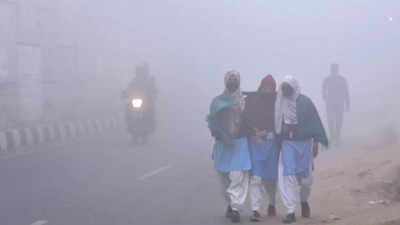
The Supreme Court of India issued a landmark directive mandating the closure of schools in Delhi and across the National Capital Region (NCR) in response to the alarming levels of air pollution. With the Air Quality Index (AQI) in the “severe” category, the apex court ordered the implementation of stringent anti-pollution measures under the Graded Response Action Plan (GRAP) Stage IV. The court’s intervention underscores the urgency of the crisis, as the toxic air in the region continues to pose a significant threat to public health, especially to vulnerable groups such as children and the elderly.
Supreme Court’s Firm Stance on Air Quality Measures
In a ruling that reflects the gravity of the situation, a bench led by Justices Abhay S. Oka and Augustine George Masih directed all governments in the NCR to immediately enforce GRAP Stage IV measures, regardless of whether AQI levels drop below the critical threshold of 450. The bench expressed dissatisfaction with the delay in implementing these measures, noting that the Commission for Air Quality Management (CAQM) had failed to act promptly. The court emphasized that the CAQM should have initiated these protocols as soon as the AQI breached the “severe” category, rather than waiting for improvement.
In its ruling, the court made it clear that the implementation of GRAP Stage IV would continue until further orders, even if AQI readings fall below 450. The court has also mandated the states and central government to submit a compliance affidavit by November 22, 2024, outlining the measures taken to curb pollution in the region.
Intensified Measures for Air Quality Control
The GRAP framework involves various stages of action, with Stage IV restrictions implemented when air quality deteriorates to hazardous levels. Under these measures, industries may be asked to reduce or halt operations, construction activities could be suspended, and restrictions could be imposed on the use of private vehicles. The court has ordered that all state governments in NCR set up monitoring teams to ensure strict compliance with these measures, and to formulate additional strategies to mitigate the pollution.
The top court also pointed out that it is the constitutional duty of the state and central governments to ensure a pollution-free environment for the citizens. This statement reflects the urgency of taking immediate action to protect the health and safety of those living in the NCR.
Delhi Schools Move to Online Classes
In Delhi, Chief Minister Atishi announced the closure of all schools for physical classes, citing the severe pollution levels and visibility issues that have dropped to just 200 meters. While students in Classes 10 and 12 preparing for board exams are allowed to attend physical classes, all other grades have transitioned to online learning indefinitely. The decision is aimed at safeguarding the health of students, who are particularly vulnerable to the harmful effects of toxic air.
Schools across NCR Take Preventive Action
In Delhi, Chief Minister Atishi announced the closure of all schools for physical classes, citing the severe pollution levels and visibility issues that have dropped to just 200 meters. While students in Classes 10 and 12 preparing for board exams are allowed to attend physical classes, all other grades have transitioned to online learning indefinitely. The decision is aimed at safeguarding the health of students, who are particularly vulnerable to the harmful effects of toxic air.
Haryana has declared holidays for primary school students up to Class 5 in both government and private schools, with local Deputy Commissioners empowered to extend holidays or shift to online classes based on AQI conditions. In Punjab, although AQI levels are in the “unhealthy” range, authorities are monitoring the situation closely and may consider temporary school closures. Meanwhile, in Uttar Pradesh, regions like Ghaziabad, Noida, and Meerut are facing severe AQI levels, but no official decisions on school closures or online classes have been made yet, with local discussions ongoing.
For more details click here.
The Way Forward: Collective Responsibility to Tackle Pollution
As the situation continues to evolve, the focus will remain on both immediate relief and long-term solutions to combat pollution in Delhi and NCR. The Supreme Court’s intervention has highlighted the need for immediate and coordinated efforts by all stakeholders — from government authorities to local citizens — to address this environmental crisis. With pollution levels forecast to remain hazardous for the coming weeks, it is crucial that stringent measures be enforced and that efforts to reduce emissions are ramped up in earnest.
The ongoing school closures and the shift to online learning are just some of the precautionary measures being taken to protect public health. However, more comprehensive actions, including improvements in public transportation, industrial regulations, and green infrastructure, will be essential to bring long-term relief to the region’s air quality.
